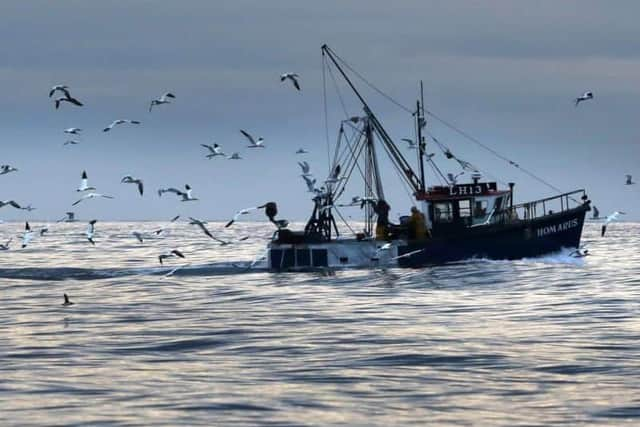Conservationists warn over fish stocks as annual catches agreed with EU
The Government said the deal with the EU will give UK fishers the opportunity to catch 140,000 tonnes of fish worth more than £280 million, after annual fisheries negotiations with the bloc concluded.
That takes the value of fishing opportunities secured for the British industry out of the three main negotiation forums between the EU, UK and Norway to £750 million – a £34 million increase on last year, the Government said.
Advertisement
Hide AdAdvertisement
Hide AdIt is the third year of annual fisheries negotiations since the UK became an independent coastal state following Brexit.


The Government, which agreed total allowable catch levels for 69 fish stocks with the EU in the negotiations, said sustainability had been at the heart of its approach to the talks.
Officials said that, “wherever possible”, catch levels had been set in line with, or lower than, the level advised by scientists at the International Council for the Exploration of the Sea (Ices), and there was an 13% increase in catch levels that aligned with Ices advice compared with last year.
Fisheries Minister Mark Spencer said: “Our agreement with the EU secures valuable fishing opportunities for the UK fishing industry while cementing our joint commitment to manage fisheries sustainably.
“These decisions are based on the latest scientific advice to help protect key fish stocks with the long-term health of the marine environment at the forefront of our minds.”
In response to an urgent question in the Commons, Mr Spencer told MPs that an initial estimate suggests nine more catch levels were aligned with the scientific advice than last year.
“This is an important step forward and will allow our most important stocks to be fished sustainably,” he said.
“This is essential for a thriving fishing industry for the future and the UK will continue to champion sustainability throughout all negotiation forums and push for all the coastal states to do so, too.”
Advertisement
Hide AdAdvertisement
Hide AdBut conservationists said that, while some of the limits agreed are better than last year, when 65% were set above the scientifically advised levels, parties have again agreed to allow overfishing in the region.
Charles Clover, executive director of the Blue Marine Foundation, said: “These catch limits show that the mismanagement of UK and EU seas is set to continue.
“Some of the limits agreed are better than last year, when 65% were set above scientific advice, but it is clear that the parties have again agreed to allow significant and demonstrable overfishing in the face of scientific evidence and their own laws.”
He accused the UK and EU of “banking” increases in recommended catches, such as a 63% increase in the limits advised for North Sea cod, while not implementing advice for other stocks, such as cod from the Irish Sea and West of Scotland where a zero catch was recommended.
“Government is taking scientific advice only when it suits them, not our depleted fish populations.
“It should strive to take the advice all of the time – which means taking extra measures to restore those populations to health,” he said.
Hugo Tagholm, executive director, Oceana UK, said: “The UK and EU continue to break their own fisheries laws, setting quotas above scientific advice and risking the long-term viability of the fishing industry, as well as driving the marine biodiversity crisis.
“Urgent action must be taken to allow fish stocks to recover, restore our marine ecosystems and ensure food security for future generations.”
Advertisement
Hide AdAdvertisement
Hide AdBut the Shetland Fishermen’s Association backed the move to negotiate a less extreme reduction in the quota for monkfish, which had been recommended for a 30% cut to catches.
SFA executive officer Simon Collins said the lower reduction was justified through scientific evidence provided by fishermen, with the 30% figure based on uncertain stock assessments disrupted by survey vessel breakdown and Covid-19.
“People should understand that no-one has a greater interest in sustainable fishing than the fishermen and communities whose futures depend on it,” he said.